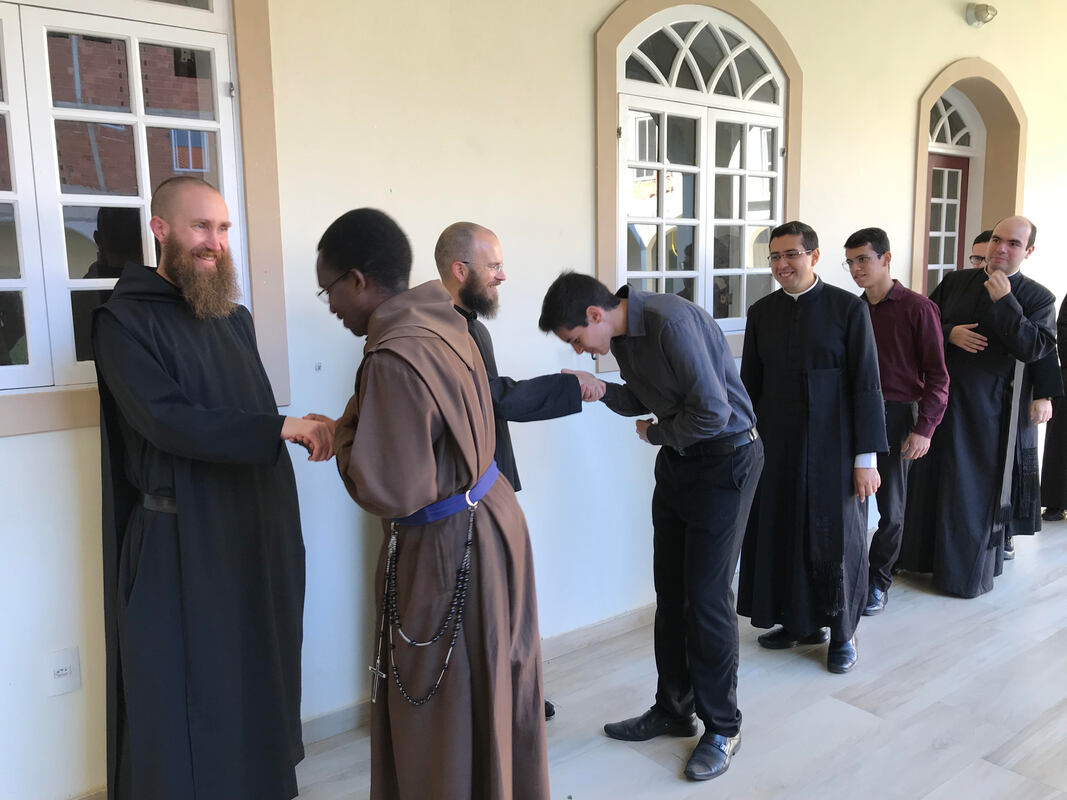|
Brazil maintains some fragments of formal manners such as I’ve never encountered in the United States. One is asking a blessing from superiors. It may be done by children asking the blessing of their parents in the morning or by children lining up to ask their school teacher’s blessing in the morning. I’ve been asked for my blessing by my godchildren, and even by children on the street in traditional communities. I’ve asked elderly ladies for their blessing and received, in all solemnity, “May God bless you” in return. It’s one of many gracious gestures that seem like drops of beauty in a world that tends to informality, hurried interactions, and disrespect.
Another, often done in conjunction with asking a blessing, is kissing of the back of the other person’s right hand. While this is a ritual gesture in the traditional Mass, it is also normal when meeting clergy on the street or at the parish, at least in the more traditional communities. In fact, it spills over again into the greeting of superiors in general, with the formal asking of a blessing from ones mother, an elderly lady, grandpa, a teacher, a religious superior or other paternal figure often accompanied by a kiss to the back of the right hand. Another delight is the use of formal address not only with superiors, but also among equals. I’ve discovered this custom in convents, seminaries and monasteries (sometimes even in those that do not celebrate the Traditional Latin Mass). It, too, is something that seems to bring a dignity and graciousness to what would otherwise be banal activities, from passing the salt, sir, to reaching for a pen, ma’am. In Portuguese this formality is conveyed by a use of the third person instead of second person: “Would the lady like more water? Might the gentleman pass me the salt?” All of this may seem fussy. I initially found it so strange that I scolded some young people at church for speaking formally to me. To my astonishment they begged me to allow them to keep the custom, as it was for them a small gesture of dignity and beauty in a world full of ugliness and disrespect. With time I’ve come to see it as part and parcel of the cultivation of a life filled with thoughtfulness and consideration, an awareness of social structure, and an honoring of the dignity of guests and superiors. In fact, I find it just as apt when addressing people least likely to be treated with any dignity at all: figuring they could use a drop of courtesy more than most of us. I do wonder what will happen to the hand kissing, a gesture that has been quite suddenly suppressed by the fears around covid, here at the end of the year 2020. It’s strange to see Brazilians in general greet each other at a distance, making awkward nods or bows which fail to convey the enthusiasm of the more usual greetings of hugs and kisses. That said, the verbal politenesses are not susceptible to germs, so have some chance of carrying on, God willing. And in daily life the attempts at new kinds of greeting seem to be losing traction, with girlfriends and moms slowly reverting to their usual kisses, and men to their handshakes and back-slaps. Ona Kiser President Comments are closed.
|
Friends of Campos, Inc.Friends of Campos, Inc. is a US-based not-for-profit (501c3) which supports the social and educational projects of the Personal Apostolic Administration of Saint John Mary Vianney, most of which are located around the diocese of Campos dos Goytacazes in the state of Rio de Janeiro, Brazil. Archives
April 2023
Categories |
FRIENDS OF CAMPOS, INC. is a 501(c)(3) tax-exempt organization.
© 2023 Friends of Campos, Inc.


 RSS Feed
RSS Feed